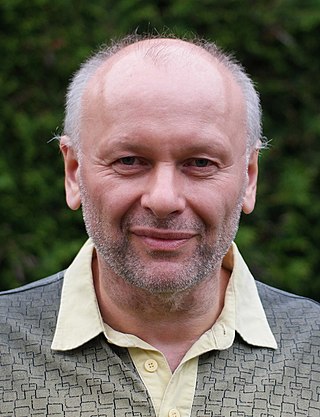Yakov Kuzyakov
Soil scientist and ecologist From Wikipedia, the free encyclopedia
Yakov Kuzyakov (born 27 August 1963) is a soil scientist professor.[1]
Yakov Kuzyakov | |
|---|---|
 | |
| Born | 27 August 1963 Moscow, USSR |
| Alma mater | Russian State Agrarian University, University of Halle |
| Scientific career | |
| Fields | Soil science, Ecology, Land use, Carbon, Nitrogen, Rhizosphere, Climate change |
Research and career
Kuzyakov graduated in 1986 from the Martin Luther University of Halle-Wittenberg in Halle. He defended his PhD at the Russian State Agrarian University – Moscow Timiryazev Agricultural Academy (Moscow) in 1990 under the supervision of Alexey Fokin. Then he headed the radioisotopic laboratory from 1990 to 1993 over there. Later in 1993 Kuzyakov continued his research at the Humboldt University of Berlin and the Leibniz Institute of Vegetable and Ornamental Crops. In 1997 he completed the habilitation at the University of Hohenheim under the supervision of Karl Stahr. In 2006 he took up a professorship at the department of Agroecosystem Research at the University of Bayreuth. Since 2011, he heads the department of Soil Science of Temperate Ecosystems and the department of Agricultural Soil Science at the University of Göttingen.[2][3]
Scientific achievements
Summarize
Perspective
Kuzyakov is a highly cited researcher in the field of Agricultural Sciences for the 2015–2023,[4][5] he was also included in the list of the most cited Russian scientists in 2017.[6] The H-index is 121 (Scopus database). Yakov has published more than 903 scientific papers,[7][8] indexed by Web of Science and Scopus databases which include:
- 19 papers in the Nature journal series,
- 50 scientific reviews,
- 64 highly cited papers (top 1% citations),
- 20 hot papers (top 0,1 % citations), cumulative amount
- 4 papers listed as the most cited over the last 50 years in Soil Biology and Biochemistry[9]
- published 95 papers in 2023, or 4 days per paper[10]
He developed new concepts of Priming effect,[11][12] Microbial hotspots and hot moments in soil,[13] Transformation of low-molecular organic compounds in soil, Rhizosphere dynamics and stationarity,[14] Root exudation and its localization, Visualization of enzyme activity in soil,[15] Competition between microorganisms and roots for nutrients,[16] Pedogenic carbonates,[17] Agropedogenesis,[18] Partitioning and quantification of CO2 sources,[19] Biochar stability [20] etc. These concepts were investigated in the frame of global climate change conditions: global warming, elevated СО2 in the atmosphere, drought, N deposition and soil degradation. He is the first to use position specific isotope labelling, 14СО2 and 13СО2 plant labelling combined with autoradiography and zymography coupling with biomarkers. The concepts, ideas and methodical approaches developed by Yakov Kuzyakov group stimulated many research directions worldwide.[21]
Research interests
Kuzyakov specialises in soil ecology and soil biogeochemistry (lipids, low molecular organic substances), agriculture, land use, agroecology, C and N cycles, priming effects, soil-plant interactions (rhizosphere processes), in-depth study of rhizodeposition, partitioning of CO2 fluxes from soil and application of radioactive and stable isotope labelling approaches in soil science.[22] He has conducted research in all climatic zones including cold deserts, tropical areas and in various ecosystems (agricultural lands, forests, mountains, pastures, etc).[23][24][25] The collaboration includes the projects with other research groups from Europe (Germany, Italy, France, Denmark, Russia, UK), Asia (China, South Korea, Indonesia), North and South America (USA, Chile), Africa (Tanzania) and Australia.[26]
References
External links
Wikiwand - on
Seamless Wikipedia browsing. On steroids.
